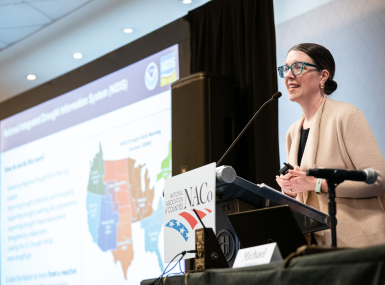Seven Coal Communities Selected to Receive Support Through National Initiative
Upcoming Events
Related News

National Association of Counties announces participants in Building Resilient Economies in Coal Communities Action Challenge
WASHINGTON – The National Association of Counties (NACo) today announced that seven communities spanning 11 counties will be the recipients of individualized planning assistance and peer learning support through the Building Resilient Economies in Coal Communities (BRECC) Action Challenge. This marks the second year for the BRECC Action Challenge, which launched in 2023 with the support of the U.S. Economic Development Administration. Its goal is to strengthen and grow opportunities in local economies shaped by coal industries.
“The U.S. Economic Development Administration is committed to helping coal communities strengthen and transition their economies,” said Assistant Secretary of Commerce for Economic Development Alejandra Y. Castillo. “Through the Building Resilient Economies in Coal Communities initiative, we’re delighted to recognize and support the seven community teams selected to participate in this second cohort of the Action Challenge. Our first group of communities prepared innovative plans and projects to drive their regional economies forward, which serve as inspiring models for those joining the initiative. The newly selected teams represent the resilient, entrepreneurial leadership that is needed to help coal communities across America build and access new, sustainable opportunities for growth in the years ahead.”
The 2024 BRECC Action Challenge communities are:
- Campbell County, Wyo.: In northeastern Wyoming, Campbell County is recognized as a leading producer of coal within the United States. Planning with county stakeholders, this team will pursue economic diversification strategies connected to industry expansion and energy production.
- Counties of Pendleton and Grant, W.Va.: In northeastern West Virginia, the counties of Pendleton and Grant recently formed a joint economic development entity, the Seneca Rocks Regional Development Authority. Collaborating across county borders, this team will pursue strategies to offer training to displaced coal workers and expand rural business development.
- Forest County, Pa.: In northwest Pennsylvania, Forest County is experiencing declines in employment connected to the closure of a coal mine and related coal-related industries. Partnering with the local school system and regional council of governments, the Forest County team will pursue strategies to expand and diversify employment opportunities across the county.
- Counties of Mason, Tazewell and Peoria, Ill.: In central Illinois, the counties of Mason, Tazewell and Peoria have been impacted by the closure of three coal-fired power plants across the region. Led by the Greater Peoria Economic Development Council, this team seeks to pursue regional economic diversification strategies related to workforce transitions and clean energy development.
- Counties of Montrose and San Miguel, Colo.: Located in the west end of southwest Colorado, Montrose and San Miguel Counties lost half of their property tax base and many residents due to the closure of power plant and local mining operation. Led by the West End Economic Development Corporation, this team will work to revive three mining towns through place-based strategies and business expansion opportunities.
- Monroe County, Ga.: Located in central Georgia, Monroe County’s employment and tax base are closely tied to a coal-fired power plant slated to be decommissioned. This team looks to learn from fellow coal-impacted communities to implement transition strategies and pursue opportunities to diversify power generation.
- Somerset County, Pa.: In the southwest corner of Pennsylvania, Somerset County is currently home to 18 mining operators. Downturns in the coal industry have resulted in job loss and adverse impacts on local businesses, specifically suppliers of mining equipment. This team seeks to support impacted employees and businesses by pursuing strategies to attract new and retain existing companies.
“NACo is proud to lead this effort to support economic diversification in our nation’s coal communities,” said NACo President Mary Jo McGuire. “Together with our partners and participating counties, we are identifying and sharing effective strategies to recover from economic downturns and enhance resiliency. The solutions we develop will be instrumental in building a brighter future for counties across America.”
BRECC’s Action Challenge will connect the community teams with economic development experts from The West Virginia Community Development Hub, EntreWorks Consulting and Community Builders. Over the duration of the year, the selected teams will receive technical assistance support to develop a locally driven economic diversification strategy, preparing community partners to pursue a diverse range of economic revitalizations projects.
Beyond the BRECC Action Challenge, BRECC includes a National Network open to all coal communities and featuring resources and bi-monthly virtual learning opportunities on economic diversification strategies. Learn more about the BRECC initiative here.
Featured Initiative
Building Resilient Economies in Coal Communities
The Building Resilient Economies in Coal Communities initiative connected coal communities, supported local leaders and built capacity in under-resourced communities to advance new approaches and projects for economic diversification.

Related News

NOAA outlines help for counties navigating drought’s growing risks
In April, the National Integrated Drought Information System will launch the Mid-Atlantic Drought Early Warning System, which will help county officials allocate resources and attention to mitigate drought-related disasters.

House Agriculture Committee introduces 2026 Farm Bill
On February 13, House Agriculture Committee Chairman G.T. Thompson (R-Pa.-15) introduced the House version of the 2026 Farm Bill, the Farm, Food, and National Security Act of 2026.
